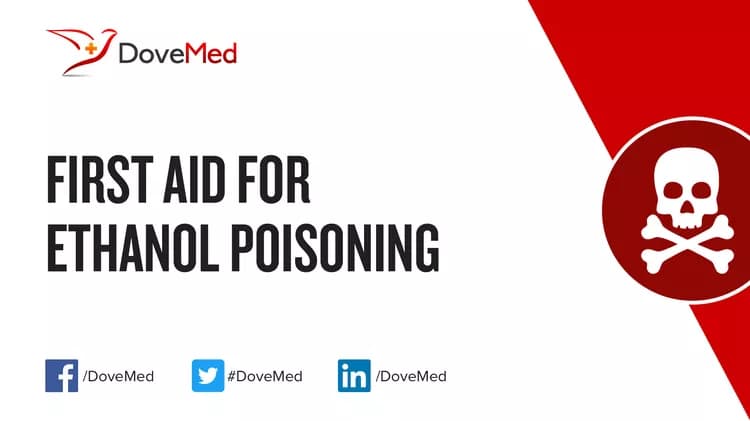What is Ethanol Poisoning?
- Ethanol or ethyl alcohol is a colorless fluid with a characteristic alcohol smell. It forms the chief component of drinking alcohol such as whiskey, brandy, wine, gin, and vodka among others
- It is also used as a medicinal solvent, antiseptic, antidote to poisoning with methyl alcohol, and sometimes, as an engine fuel
- Ethanol Poisoning is the accidental or intentional intake of the compound. The intake is through swallowing the compound. It is a condition in which the amount of ethyl alcohol in one’s bloodstream reaches toxic levels, resulting in an adverse reaction
- The condition is diagnosed based upon the clinical history, combination of signs and symptoms, and additional tests (that may include, in some cases, radiological studies and laboratory tests)
Ethanol Poisoning may be also referred to variously as the following:
- Drinking Alcohol Poisoning
- Ethanol Toxicity
- Ethyl Alcohol Poisoning
What are the Causes of Ethanol Poisoning?
- Ethanol Poisoning is generally caused by an excessive consumption of drinking alcohol
- This intake could be accidental, or in some cases intentional, to bring self-harm
- The amount of alcohol that leads to poisoning varies based on the gender, age, weight, and health status of the individual
Note: The compound can interact with other prescribed or non-prescribed medications in the body. Such interactions may enhance the therapeutic effects of other medications being taken, resulting in undesired side effects.
What are the Signs and Symptoms of Ethanol Poisoning?
The signs and symptoms of Ethanol Poisoning can vary from one individual to another. It may be mild in some and severe in others. Several systems of the body, such as the digestive system, respiratory system, and nervous system, may be affected.
The signs and symptoms of Ethanol Poisoning may include:
- Confusion
- Breathing difficulties
- Slurred speech
- Difficulty breathing; depressed heart rate
- Vomiting and nausea; blood in vomit, in some cases
- Intestinal bleeding and severe stomach pain
- Loss of consciousness or reduced consciousness
- Lack of coordination and unsteadiness
- Coma
How is First Aid administered for Ethanol Poisoning?
First Aid tips for Ethanol Poisoning:
- If the individual is unconscious, call 911 (or your local emergency number) immediately
- Call the Poison Control Center at 1-800-222-1222 (or your local poison control center) for further instructions
- Provide them with information such as the compound taken, quantity and time of ingestion, age, weight and general health status of affected individual
- Confirm that the airways are protected; also, ensure breathing and the presence of pulse
- If the individual has trouble breathing, administer CPR
- If the individual is sleepy, try gently to awake him/her and place them in a comfortable sleep position
- In case the individual is vomiting, turn sideways to avoid choking on their own vomit
- Unless instructed by a healthcare professional, DO NOT induce vomiting in the affected individual
- Take individual to emergency room (ER) for further treatment
- Always try to take the compound bottle/container to the ER
The emergency medical health professional might perform the following steps towards treating the condition:
- Monitor vital signs
- Medically manage symptoms and provide breathing support, if necessary
- Administer medications to treat the symptoms
- Administer fluids by an intravenous drip line
Who should administer First Aid for Ethanol Poisoning?
First aid for Ethanol Poisoning is usually administered by healthcare professionals.
- The individual who is affected, or someone near, should call 911 for emergency assistance (or the local emergency number)
- They should also call the poison control center at 1-800-222-1222 (or the local poison control center) and follow instructions
What is the Prognosis of Ethanol Poisoning?
- The prognosis of Ethanol Poisoning is dependent on the blood alcohol level, time between consumption and treatment, severity of the symptoms, and general health of the individual
- If the individual survives the first 24 hours after alcohol poisoning, the prognosis is usually good
In general, toxicities are common situations in the emergency departments. A majority of the cases are often not fatal, when appropriate treatment is given.
How can Ethanol Poisoning be Prevented?
Ethanol Poisoning can be prevented by:
- Consuming alcohol in moderation
- Avoiding multiple drinks in one sitting and take no more than one drink every hour
- Staying well-hydrated
- Keeping cosmetics, medications, and other healthcare products out of reach of children in child-proof containers
- Keeping any poisonous/hazardous chemicals and other materials out of children’s reach
- Keep all poisons correctly labeled and in suitable storage locations
- Being aware of basic first aid steps in case of an emergency (such as inadvertent poisoning)
What are certain Crucial Steps to be followed?
- Call 911 (or your local emergency number) for emergency assistance, in case of loss of consciousness or respiratory depression
- Call Poison Control Center at 1-800-222-1222 (or the local poison control center) and follow the recommend steps
- Get the individual with Ethanol Poisoning the necessary medical attention, as early as possible
- It would be helpful if the following information is readily available:
- Type, amount and time of consumption of the substance
- Age and weight of the individual
- And, the overall health status of the individual
Related Articles
Test Your Knowledge
Asked by users
Related Centers
Related Specialties
Related Physicians
Related Procedures
Related Resources
Join DoveHubs
and connect with fellow professionals


0 Comments
Please log in to post a comment.